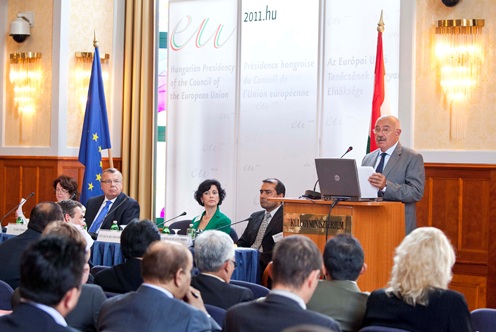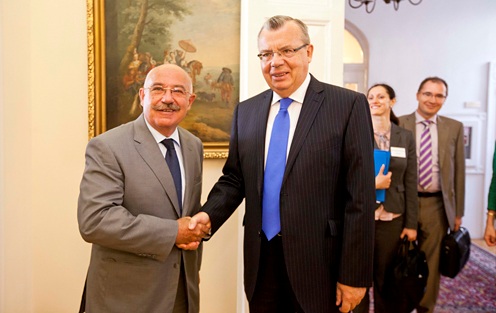
The United Nations Office on Drugs and Crime (UNODC), together with the Government of Hungary and in cooperation with the United Nations Office of the Counter-Terrorism Implementation Task Force (CTITF) has organized a one-day seminar aimed at sharing best practices and enhancing national, regional and international capacity in countering terrorism.
Attended by counter-terrorism practitioners from over 60 Governments and international organizations from various parts of the world, the Seminar focused on promoting awareness of the UN Global Counter-Terrorism Strategy as well as highlighting concrete and practical actions taken at regional and global levels in implementing the action points of the Strategy, with a special focus on the Central Asian and African regions. The event was opened by Mr. János Martony , Hungarian Minister of Foreign Affairs and Mr. Yury Fedotov, Executive Director of UNODC.
In his speech, Mr. Martony highlighted that Hungary, currently holding the Presidency of the Council of the European Union, attaches particular importance to the close cooperation between the EU and the UN system as a whole in strengthening international action against terrorism. The UN plays a crucial role in overcoming today’s new types of cross-border security challenges. Mr. Martonyi also emphasized the importance of respect for democratic values and human rights, political and religious tolerance and the rule of law in the fight against terrorism. In connection to this, the Minister stated that Hungary fully supports the efforts made by different UN actors, including the assistance provided by the UNODC, the CTITF and the CTED to Member States, as well as other regional organizations, such as the OSCE, the African Union and the Commonwealth of Independent States, in implementing the Global Counter-Terrorism Strategy and is ready to pass on its experience to the countries which are currently under political transformation.

In his address to the Budapest event, UNODC Executive Director Yury Fedotov emphasized that the aim of the UNODC programs developed for the implementation of the UN Counter-Terrorism Strategy is the elimination of the reasons leading to the spread of terrorism and counter-terrorism capacity building of Member States. He reaffirmed his Office’s commitment to working with countries on this front. Mr. Fedotov also said that while actions taken so far have been successful, much remains to be done to fight the global scourge of terrorism, in particular with regards to enhanced cooperation and exchange of information between member states.
At a side-event to the Seminar organized on 16 June, participants could become acquainted with the Hungarian Counter Terrorism Center established in September 2010 and were presented the Hungarian Model of counter-terrorism coordination.

Adopted in 2006 by all Member States of the United Nations, the UN Counter-Terrorism Strategy is the blueprint of the international community’s response to terrorism. It is built of four pillars which aim to provide an across-the board, internationally appropriate response to this threat: a) tackling the conditions conducive to the spread of terrorism; b) preventing and combating terrorism; c) building states’ capacity to prevent and combat terrorism and strengthening the role of the United Nations system in that regard; and d) ensuring respect for human rights for all and the rule of law as a fundamental basis for the fight against terrorism.
The objective of the UNODC is to promote joint action against the various forms of cross-border crime. As a key member of the CTITF, the Office is playing an active role in supporting the implementation of the Strategy by providing technical and legislative assistance to Member States through its extensive network of field offices and expertise.
(Source: kormany.hu)